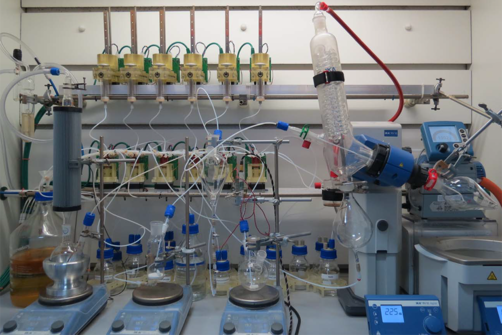Division Structure Analysis is currently seeking a student (f/m/d) for the project "Development of a fast and automated access to iron-nickel nanoparticles with desired iron:nickel ratios using a programmable automated synthesis device"
Iron-nickel nanoparticles (FeNi NPs) are a useful nanomaterial with demonstrated applicability in chemical catalysis, environmental pollutant degradation, biomedicine, ferrofluids and others. In these applications both the chemical reactivity of the NPs, as well as their magnetic properties are significantly affected by the composition of the NPs, namely the Fe:Ni ratio. Although the nanoparticles can be easily synthesized through simple aqueous reduction of common inorganic salt precursors (such as FeCl2 and NiCl2) with a suitable reducing agent (like NaBH4 or N2H4) this method has not been implemented for use in automated systems. The current difficulties with implementation of such method as an automated protocol is the difficulty in controlling the Fe:Ni ratio in the NPs due to different reduction potentials of both metals. Variables influencing the composition of the final NPs are the initial Fe:Ni ratio and reaction conditions like temperature, time, reactants’ concentrations and others. This leaves a large variable space to be explored and this could be perfectly achieved using an automated chemical synthesis device.
Exploration of the reaction variable space versus the final NP composition would allow for a development of a general method for synthesis of FeNi NPs of any composition. Such method in a form of a computer program implementing such synthesis in “Chemputer” would allow for rapid access to nanoparticles with arbitrary Fe:Ni ratios depending on what the application requires without further trial-and-error experimentation in the laboratory. Due to easy implementation of methods that can be expressed as computer codes in a transferrable coding language, such as Python, the method would be rapidly implementable in any laboratory that possess an equivalent automated chemical synthesis device.
The project would involve performing synthesis of FeNi NPs using the “Chemputer” under a variety of conditions and analyzing them using among others SEM, XRF and XRD techniques. A general synthesis procedure/program for arbitrary NP compositions will be developed.

The “chemputer”
Source: BAM, Structure Analysis Division
Project duration: to be agreed, typically 2-6 months depending if it is a BSc or MSc, but can be extended
Requirements
- Studies in a subject related to experimental Natural Sciences e.g. Chemistry, Materials Science, Geosciences/Mineralogy/Crystallography etc.
- At least basic Python skills are essential. Intermediate or Advanced Python is preferred;
- Proficiency in English is NOT required
Contact
CV and a letter of motivation to tomasz.stawski@bam.de; Either in DE or EN.
Dr. Tomasz Stawski
Division Structure Analysis
Phone: +49 330 8104 3395
Email: tomasz.stawski@bam.de


